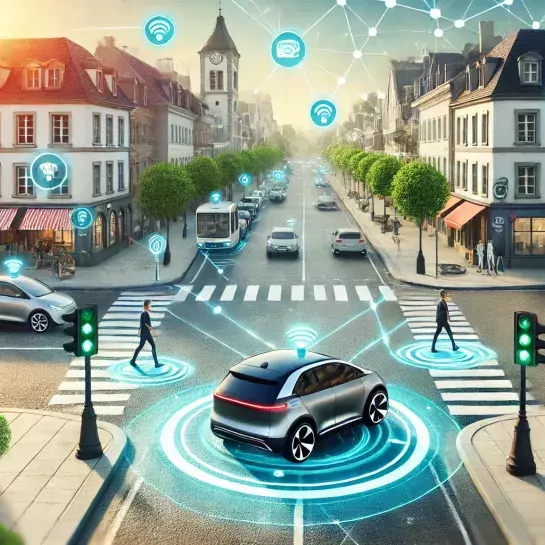
Acronym: RESKILLING
Title: : Research initiative for Enhancing and Adapting Workforce SKILLs for Implementing TraNsport Automation with Employment Growth
| Call | HORIZON-CL5-2023-D6-01 |
| EU nr | 101147328 |
| Period | 36 months - 01.01.2025 to 31.12.2027 |
| Project budget | € 1,999,815.62 |
| VUB budget | € 129,062.50 |
| Project Promotor and co-promotor | Prof. Lieselot Vanhaverbeke and Evy Rombaut |
| Project Management | Evy Rombaut |
| Business Development | Gabriela Barrera |
What is RESKILLING's main goal for Europe's mobility sector?
RESKILLING envisions to implement a strategic approach, which will empower the workforce and businesses of Europe's mobility (of people and goods) sector, to effectively cope with the anticipated changes in the sector from CCAM* deployment, but also to actively participate in advancing and refining the sector. RESKILLING aims to propose, implement, apply and validate a comprehensive approach, guided by inclusiveness, co-creation, and social innovation principles, which will efficiently and sustainably coordinate a range of novel services and tools, fostering optimal adaptation of the mobility sector (covering both people and goods) to the deployment of CCAM solutions and services. This will range from analysing the socio-economic and employment impacts of CCAM across the entire value chain to facilitating businesses and workers in mitigating drawbacks and leveraging opportunities brought about by CCAM deployment. This involves innovating business models and employing mechanisms and tools for skill enhancement and adaptation, with an emphasis on their replication and transferability potential and customised scalability for adoption throughout the EU. RESKILLING aspires to create a CCAM (socially) innovative system capable of not only generating innovation but also delivering solutions to societal challenges.
How will RESKILLING help workers adapt to automated mobility?
RESKILLING aims to support the development of educational plans and activities (e.g. for curricula, lifelong learning initiatives) as well as reskilling efforts to develop human capital in innovative mobility systems and services through education and training, thereby realising the benefits of a large deployment of CCAM solutions through the definition and prioritisation of at least 20 novel (re/up)skilling schemes, the development and adaptation of at least 10 training curricula and the full development of at least 3 novel training modules (inclusive of content and related tools). These developed trainings will address the identified skills and (re)training requirements and the diverse training profiles for (re/up)skilling, providing particular attention to specialized workforce categories and their requirements for (re)training. These schemes will be evaluated through the project’s case studies and contribute to the RESKILLING Guidelines, Policy Recommendations and Roadmap.
How does RESKILLING plan to address broader societal challenges?
RESKILLING delves into three areas that have the potential to foster job creation and job growth through strategies that aim to boost innovation capabilities and develop competitive CCAM solutions and associated businesses: (i) human capital development, through (re)skilling journeys and training profiles that cover primary and lifelong training along the entire CCAM value chain, encompassing also the analysis of workforce skills transferability and integration for multimodal transport; (ii) business models & schemes for CCAM innovation and jobs promotion and (iii) a systemic approach for achieving tailored scalability for EU-wide adoption. Moreover, a collaborative mission for a socially innovative ecosystem will be established to empower stakeholders to design training and reskilling initiatives that align with societal needs. To achieve this, future scenarios will be also collaboratively developed and appropriate strategies will be formulated for their dissemination. Guidelines and policy recommendations to maximise positive impacts on workforce skills and employment growth, allowing also proactive planning, will be co-created, as well as a Roadmap, offering a structured and forward-thinking strategy for facilitating an equitable socio-economic transition to CCAM that will lay the groundwork for job growth, enhanced innovation capacity, as well as the definition of skill requirements over a defined time frame: the short term (up to 2030), mid-term (up to 2040), and long term (up to 2050).
What is VUB’s role in the RESKILLING consortium?
MOBI is work package leader of WP5 Impact Assessment & Roadmap. The aim of this WP is to assess the project’s impact on the mobility of people & goods sector, focusing on enhancing and adapting workforce skills; to build an impact assessment framework to evaluate the socio-economic impacts of CCAM deployment on employment, education and training; to foster tailored scalability for EU-wide adoption; to provide guidelines and policy recommendations for support and accelerate the take- up of CCAM, based on the assessment findings and to develop a Roadmap to support the socio-economic transition to CCAM and enhance the adaptation of workforce skills, implementing CCAM deployment with employment growth. Within this WP, VUB is task leader of task 5.4 Roadmap to support the socio-economic transition to CCAM. In this task, a full Roadmap will be developed, presenting a structured and forward-looking approach on how to facilitate the fair socio-economic transition to CCAM and provide prerequisites for job growth, strengthened innovation capabilities, and demands for skills in the short (until 2030), mid (until 2040) and long (until 2050) terms. The roadmap will build on the guidelines and policy recommendations of T5.3, suggesting changes to existing policies, regulations, and strategies, giving special emphasis on the social impact considerations of WP3 and WP5, considering both employment growth and innovation capabilities but also potential challenges and risks and strategies to mitigate these risks (SWOT & FMEA analyses will be utilised for this purpose).
*Cooperative, Connected, and Automated Mobility (CCAM) refers to the integration of advanced technologies that enable vehicles to communicate with each other (V2V) and with infrastructure (V2I). The goal of CCAM is to make transportation safer, more efficient, and environmentally friendly by leveraging automation and connectivity.
